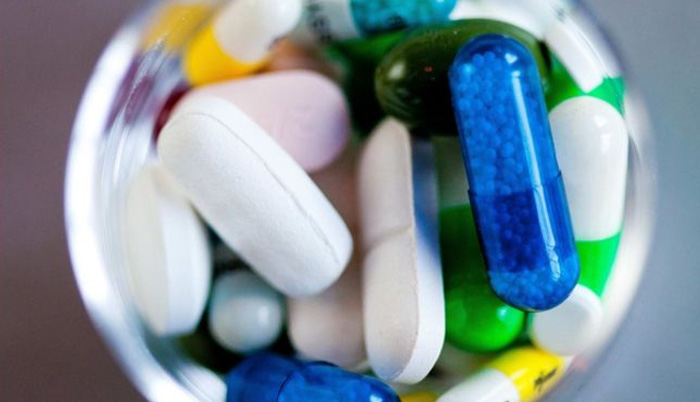![]() Home > Health
Home > Health
People Who Take Antibiotics For A Long Time Are More Likely To Develop Growths On The Bowel Which Can Be A Precursor To Cancer, A Study Suggests.

GARO/PHANIE/SCIENCE PHOTO LIBRARY
![]() April 6th, 2017 | 09:13 AM |
April 6th, 2017 | 09:13 AM | ![]() 888 views
888 views
NATURALNEWS.COM
Researchers say this adds to emerging evidence that the diversity of bugs in the gut could have role in the development of tumours.
Their paper appears in the journal Gut.
But experts warn that the early results need further investigation and say people should not stop taking antibiotics.
'Hostile bugs'
Bowel polyps - small growths on the lining of bowel - are common, affecting 15%-20% of the UK population.
In most cases, they do not cause any symptoms and do not become cancerous but some go on to develop into cancers if left untreated.
In this study, researchers looked at data from 16,600 nurses who were taking part in a long-term US trial called the Nurses' Health Study.
They found that nurses who had taken antibiotics for two months or more, between the ages of 20 and 39, were more likely to be diagnosed with particular types of bowel polyps - known as adenomas - in later life, compared wtih people who had not taken long-term antibiotics in their 20s and 30s.
And women who had taken antibiotics for two months or more in their 40s and 50s were even more likely to be diagnosed with an adenoma decades later.
But the study does not look at how many polyps went on to become cancerous.
The authors say their research cannot prove that antibiotics lead to the development of cancer and acknowledge that the bacteria which the drugs are deployed to treat might also play an important role.
But they say there is a "plausible biological explanation" for the patterns seen.
Writing in the journal they said: "Antibiotics fundamentally alter the gut microbiome, by curbing the diversity and number of bacteria, and reducing the resistance to hostile bugs."
"This might all have a crucial role in the development of bowel cancer, added to which the bugs that require antibiotics may induce inflammation, which is a known risk for the development of bowel cancer."
They added: "The findings if confirmed by other studies, suggest the potential need to limit the use of antibiotics and sources of inflammation that may drive tumour formation."
'Slight and variable'
Meanwhile, Dr Sheena Cruickshank, am immunology expert at the University of Manchester, said anything that disturbs our gut bacteria, such as changes in diet, inflammation or antibiotic use, could potentially have an impact on our health.
But she said it was difficult to tease out whether other factors - like diet - could be more deeply involved in the current study.
She added: "This study's findings imply that any risk is very slight and also quite variable.
"Whilst the data adds to our growing knowledge of the importance of the gut bacteria to our health, I would be concerned about advising people to avoid using antibiotics.
"Antibiotics are crucial medicines for treating bacterial infections and, if prescribed and used appropriately, can be life-saving."
What increases the chance of getting bowel cancer?
A diet high in red or processed meats and low in fibre can increase the risk, according to NHS Choices.
NHS experts also say bowel cancer is more common in people who are overweight or obese and people who are inactive.
Drinking a lot of alcohol and smoking also increase the chance of getting cancer of the bowel.
And people who have bowel cancer in the family can also be at higher risk.
What about people taking long-term antibiotics?
Dr Jasmine Just, health information officer at the charity Cancer Research UK told the BBC: "This research is at a very early stage so it is too early to draw definitive conclusions.
"People who are prescribed antibiotics by medical professionals should continue taking them and discuss any concerns with their doctor."
Meanwhile Dr Cruickshank added that a prescribed course of antibiotics - which can be life-saving in some circumstances - should not be stopped without expert guidance.
How great are the risks?
Experts say it is difficult to be sure of exact risks for individuals from this paper. That's because the paper looks at precursors of cancer, not cancer itself.
The risk of bowel cancer can depend on many things- a family history of bowel cancer, diet, alcohol and smoking all play a part.
Interpreting the results, Dr Cruickshank describes any potential increased risk is "very slight and very variable."
Meanwhile Dr Just, said: "It is not possible to be sure of cause and effect from this paper. We are still one step away from being able to suggest either way whether there is an increased risk.
"But this is very interesting research that builds on other studies looking at how the microbes in the bowel affect our health."
Source:
courtesy of BBC HEALTH
by BBC NEWS
If you have any stories or news that you would like to share with the global online community, please feel free to share it with us by contacting us directly at [email protected]